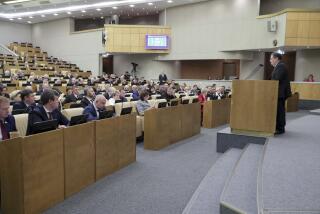Gorbachev Hits Soviets With 5% Sales Tax
- Share via
MOSCOW — Soviet President Mikhail S. Gorbachev, his government desperately strapped for cash to finance next year’s budget, imposed a 5% sales tax Saturday on all consumer goods and services, effective New Year’s Day.
In a brief decree, Gorbachev said that the tax is needed mainly for social programs and to reduce the budget deficit and that it will apply to sales of “manufactured and technological commodities, consumer goods, work and paid services.”
The decree, published by the official news agency Tass and read on Soviet television Saturday evening, did not specify any exemptions for food or other necessities.
The Soviet budget for 1991 is in deep trouble. Democratically elected legislatures have voted for $50 billion in new pension plans and other programs, but the government, already struggling with massive deficits from previous years and a soaring inflation rate, has complained that it simply does not have the money to pay for them.
Its financial difficulties are heightened by the country’s slow and hesitant transition from a centrally planned to a market-driven economy.
The government is in the process of giving up its near-total ownership of the country’s industry and with it the right to the corporate profits that, in addition to taxes, have financed 27% of the government’s operation and a complex system of subsidies for consumer goods, raw materials and other low-priced products.
Although both corporate and personal income tax systems have been revised recently to strengthen state revenues, the government has not yet instituted an effective way to collect them; a Soviet equivalent to the U.S. Internal Revenue Service is notably lacking.
In a further blow to next year’s budget, Russian leader Boris N. Yeltsin, the president of the largest and richest of the 15 Soviet republics, is seeking to cut Russia’s contribution by almost 85%, or about $215 billion at the official ruble exchange rate. Next year’s projected state budget is about $450 billion.
Negotiations on Russia’s contribution are to continue in January, but Yeltsin’s unwillingness to finance programs that he does not control jeopardizes the entire national budget, with Gorbachev warning last week that it threatens “the collapse not only of the economy but of the country.”
Explaining the need for the new sales tax to Parliament last week, Finance Minister Valentin S. Pavlov said that with national income falling, less foreign currency earned from exports and price reforms incomplete, the government budget deficit could turn out to be astronomical.
But with the sales tax and a new “stabilization fund,” he said, it could be reduced to about 50 billion rubles, or $90 billion, less than the deficit of at least 90 billion rubles, or $162 billion, expected this year prior to loans from the State Bank.
The stabilization fund, established by another Gorbachev decree on Saturday, is meant to cushion the impact of the move to a market economy by providing subsidies to those industries and republics that will be hit hard as state prices are replaced by those based on supply and demand.
The decree said the fund would also finance scientific research, the conversion of military industries to civilian production and other programs “in the interests of all republics.”
The fund will draw its money from additional taxes on industry, as well as by taking 20% of payments the state receives for selling off government property in a privatization program that has not yet been outlined. The other 80% of the sell-off money will go toward covering the budget deficit, according to the decree.
The Supreme Soviet, the country’s legislature, granted Gorbachev full powers this fall to issue virtually any decrees governing the economy.
However, Yeltsin’s Russian Federation, which is geared toward more radical reform than Gorbachev’s central government, has insisted on its own financial policy and may not obey the decree.
More to Read
Sign up for Essential California
The most important California stories and recommendations in your inbox every morning.
You may occasionally receive promotional content from the Los Angeles Times.













